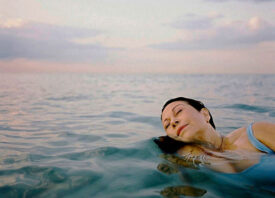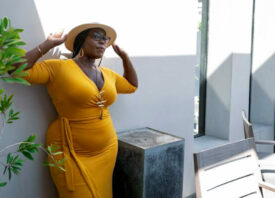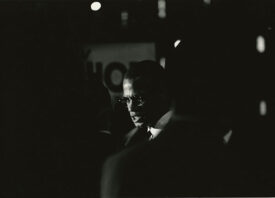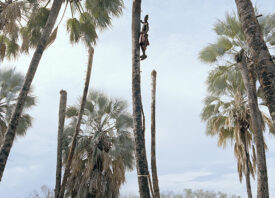Search this site
Classes Delve into Photography Ethics


As digital photography radically democratizes the medium, taking it out of the provenance of a once-elite group of image-makers and gatekeepers, the subject of ethics in photography has come to the fore. Long overdue, we can finally begin to confront issues of bias, morality, and principle that have long infiltrated the medium by many of its most prominent practitioners.
Most recently, the Magnum Photos board voted unanimously to suspect veteran photojournalist David Alan Harvey’s membership after allegations of sexual harassment by a female colleague, as first reported in The Guardian. The suspension follows, but is not related to, the recent discovery of photographs Harvey made in 1989 depicting Thai sex workers who appear to be underage After being alerted to the presence of these images, Magnum took down its entire archive for what they described as a “comprehensive review – with outside guidance.”
Though recent, these are far from the first allegations made against a prominent figure in the industry, as the #MeToo movement brought to light the behavior of numerous men in the industry. But beyond their behavior behind the camera are the issues of what happens before the lens is even raised — the ethical issues with which all photographers, professional and amateur, must contend to produce work that cultivates social responsibility rather than profit off opportunism.
Savannah Dodd, Founder and Director of the Photography Ethics Centre, shares her insights into establishing an organization dedicated to raising awareness and promoting ethical literacy across the photography industry through a variety of programs including online training, guest speaking, and interactive workshops. Here she speaks about the key ethical issues facing photographers today.

To begin, can you give us a sense of the state of the world in 2017 and how global events informed the issues you wanted to explore in the creation of the Photography Ethics Centre?
“When I decided to start the Photography Ethics Centre in 2017, there were a number of major geopolitical events happening at the time, namely the migration of Syrian refugees across the Mediterranean, the surge of violence against the Rohingya community in Myanmar, and British secession from the EU.
“With all of these events, as with most events in the media today, photography played a major role. Sometimes photographs were used to promote empathy and compassion, while at other times photographs were used to stoke fear and bigotry. But the thing that was universal among them was the immense power that photographs had shape popular consciousness about an issue, and, therefore, political will.
“Around the same time, on an intrapersonal level, I was spending more time with professional photographers at exhibitions and events. I started raising questions about asking for consent and negotiating access. While some of the photographers I spoke with were very passionate on the subject and eager to have these conversations, others were wholly unprepared for these questions. I realized that there was a need for educational opportunities for photographers at all levels to improve their ethical literacy. Given the important role photography plays in the world today, we need photographers to develop the skills to produce work ethically.”
Could you speak about the power of photography, and the ethical issues that shape how this power can be used to help or to harm?
“Photographs are particularly powerful at shaping how we view and understand the world around us. Each time we take and share a photograph, we are contributing to what the world knows about the subject. Take and share a picture of a beach in Ireland? People learn a little bit more about beaches in Ireland. This is pretty straightforward, but we are rarely conscious of our representational power as photographers when we are uploading a photo to social media.
“While some photographs that we take and share are innocuous, others risk perpetuating harmful stereotypes. Some stereotypes are so imbedded in our way of seeing the world that we may not be aware of them, much less question them.
“In order to avoid sharing photographs that perpetuate stereotypes, we need to be very self-reflexive about our own biases, and we need to carefully consider what our photographs are saying. We need to think about what tropes a photograph invokes or rejects, what conventions we have used, and where those conventions come from. A lot of the conventions that we accept as being a sign of ‘good’ photographs are not just benign aesthetic decisions; they carry meaning and shape the way the viewer understands the scene pictured in an image.
“When we share a photograph, we have an opportunity to contribute to the visual record of whatever we have photographed. We can use that opportunity to either challenge or perpetuate stereotypes.”

Could you speak about how the democratization of photography and how the rise of social media has expanded the role of photography in our daily lives?
“The democratization of photography and the rise of social media has meant that we are living in an increasingly visual world. We are constantly inundated with visual media, and we are constantly creating visual media. There is tremendous potential to enable people to communicate in ways beyond written and spoken word. However, many of us are ill-equipped to harness the power of photography effectively. We are taught to read and write in school, but most of us are not taught how to read and make photographs.”
What are the key ethical issues in photography in 2020?
“Representation has always been a major ethical issue in photography, but it’s getting a lot more airtime now thanks to the Black Lives Matter movement. The history of photography is steeped in colonialism and has been dominated by white men. This has led to a very specific portrayal of the world through the white, male lens. There are a number of brilliant organizations like Authority Collective, Women Photograph, and Diversify Photo that have been working very hard to shift this industry-wide imbalance.
“For individual photographers, I think that this is a moment to pause and really thoughtfully consider what is it that we are photographing and why we are photographing it. The culture of photography awards often leads people to photograph things that seem award-winning, without consider whether we are best-placed to tell that story. (There is another whole conversation that could be had here about what constitute “award-winning.”) We need to step back and listen to people from the communities are a photographing, to seek out photographers from those communities, and to bow out when work should go to Black photographers, photographers of color, and female and non-binary photographers.
“There are a number of other ethical issues that have come up in recent months, including questions of consent, identifiability and safety, and the exploitation of vulnerable minors. There will no doubt be many more ethical issues hotly debated on Twitter before the year is through. Although there are many deeply concerning practices that are coming to light, I find it really invigorating that there are so many people who are so passionate about photography ethics and who are having these conversations.”
What are three important questions a photographer can use to check their ethics?
“This is a really difficult question because ethics should really be embedded into the photography process, from the initial concept all the way through to publication. But if I had to pick three questions, I suppose they would be:
“1. What am I representing and why? Whenever we are taking and sharing photographs, we are engaging in a process of representation. Thinking critically about what it is you are trying to represent and why you are doing it is an essential first step in exploring the ethics of your photography process.
“2. Do my photographs and captions accurately represent the event? This is an important question to ensure our integrity as visual storytellers, and to highlight our biases and assumptions. It asks us to consider whether our photographs really tell the whole story. What have I cropped out? What have I focused on? And why?
“3. What impact could these photographs have on the viewer, on the individual(s) represented, and on others? We are not producing work in a vacuum. Our photographs will have a very real impact on the world around us. We have a responsibility to consider what that impact might be, and to mitigate any potential harm that could come to the people in our photographs as a result of our work.”

Can you tell us about the Photographer’s Ethical Toolkit and the online Photojournalism Ethics Series, and the practical benefits of these courses?
“Our first online course, the Photographer’s Ethical Toolkit, was launched in 2018 in partnership with the Thomson Foundation on the Journalism Now platform. This course is available for free as a basic introduction to photography ethics.
“While we intended for this first course to be accessible for photographers at all levels, we felt that there was also a need to offer something that goes into a lot more depth and that relates directly to the work of photojournalists and documentary photographers. This is why we developed the Photojournalism Ethics series. In this 3-module series of self-paced courses, we explore the meaning of accuracy, the role of empathy and power in the photographic process, and the impact of our work on ourselves and on others.
“It is important to make clear that we do not aim to define what is ethically ‘right’ or ‘wrong.’ Instead, our objective is to provide a space for photographers to take time out to reflect on what ethics means in their practice. Using material that we have designed and curated, we hope that photographers will engage with example ethical dilemmas and reflect on their past work.
“It is important that we take time to consider the ethics of our practice and understand where our red lines in advance, because it is extremely difficult to make ethical decisions in the moment and often these decisions have to happen in a split second. By thinking through their ethics in advance, we aim for photographers to leave our courses better prepared to face ethical dilemmas and to respond with sound judgement.
“Experience of working through difficult ethical considerations gives photographers tangible tools to be more effective in their work. It can help us to build better relationships, to communicate more effectively, and to gain access to communities in a socially responsible way. It also helps to ensure that we do not unknowingly breaching national or international laws and ethical norms about privacy and confidentiality, consent, and child protection.
Lastly, as we are living in a time fraught with factionalization and strife, how can a practice of ethical photography be used to unite us across so many divides?
“I think that photography ethics has huge potential for bringing people together in many different ways. Among the photography community, I think there is potential for constructive conversations about ethics to unite us, rather than divide us. At the Photography Ethics Centre, we approach ethics as principles that guide a person’s behavior. By approaching ethics using a principles basis, rather than as concrete guidelines or strict rules, we can all agree that certain ethical principles are important, like integrity and respect, but we can also understand that how we apply these principles may be different from person to person and from context to context. I believe that this could help to foster a more constructive conversation about photography ethics, whereby people can establish common ground by agreeing to certain ethical principles and explain their reasoning if they take different tacks.
“More broadly, a practice of ethical photography has so much potential to bridge divides in our society. By representing communities and social issues with more nuance and by moving beyond stereotypes with our photographs, we can foster empathy and connection among people from vastly different backgrounds. Photography has so much power to shape the way people understand the world around them. If we produce work that is based on a premise of empathy and dignity, if we take time to really understand who we are photographing, and if we ensure that we are telling the full story with all of its complexity, I think we can change the world.”
All images courtesy of the Photograph Ethics Centre.



